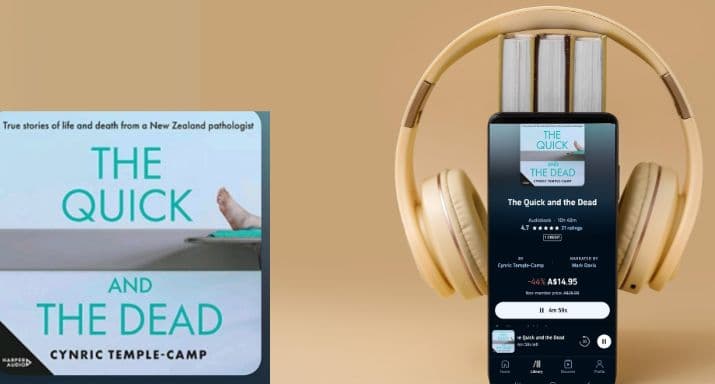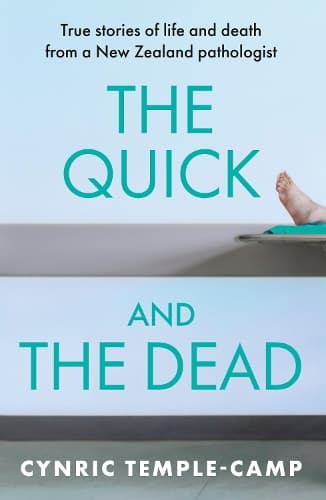Audiobook review: The Quick and the Dead by Dr Cynric Temple-Camp

Audiobook and true crime lover Kate Coughlan gets chills while reviewing The Quick and the Dead by NZ pathologist Dr Cynric Temple-Camp.
Title: The Quick and the Dead
Author: Cynric Temple-Camp
Narrator: Mark Davis
Length: 10 hours, 48 minutes
Released: 8 July 2020
Publisher: HarperAudio
Reviewer: Kate Coughlan
Death, the destiny that ultimately awaits us all, comes in many guises and sometimes in very complicated disguises. The cadavers upon a gurney in Dr Cynric Temple-Camp’s Palmerston North mortuary have met the kind of end most of us wish to avoid. It will be at least mysterious, possibly gruesome and perhaps caused by someone with evil intent. And the living, whose body tissue slides end up under the lens of his laboratory microscope, almost certainly wish they’d never needed his answers to whatever unusual and generally unwelcome happening in their bodies.
Awaiting with a curious expression and either a scalpel or microscope at the ready will be Dr Temple-Camp, both a detective of death and an expert in living human tissue. Over many decades, the Manawatu police have called upon his diagnostic skills to identify the causes of mysterious deaths and by medical professionals to find the causes of mysterious diseases afflicting living patients.
A word of warning: readers prone to catastrophising about their health are well-advised to steer clear. While not a ‘worried well’ type of human, my anxiety about what might befall those I love (young granddaughters, for example) has risen steeply. So many things can go wrong, and let me frighten you with one example: a verruca removed from the sole of a young woman’s foot led to her subsequent death from necrotising fasciitis (flesh-eating disease) and implicated a commonly prescribed painkiller. A ghastly story of minor surgery with a fatal outcome, and one that kept me awake all night.
I’ve had that experience before: the scared sleepless one, not the flesh-eating disease. I was 13 or 14 and babysitting for young cousins on a farm in the Canterbury foothills. My aunt left a book on the nightstand by the bed I was to sleep in. It was a copy of No Remedy for Death: The memoirs of a pathologist, first published in 1970. Its author, Dr P P Lynch, was my grandma’s brother, and I’d seen Uncle Phil’s book many times before in various relative’s homes but never read it. I picked it up that night, and after an hour or so among such chapters as “The Gruesome Garden”, “The Bitter Cake”, and “Horror on Mt Victoria”, I was petrified that murderers lurked outside in the dark and lonely night. When the farm dog started barking, I knew it to be so, and I crept into the bedroom of my little cousins to keep guard with the fire poker. We survived the night without any murderers.
This is Dr Temple-Camp’s second book and follows his highly successful first, The Cause of Death: True Stories of Death and Murder from a New Zealand Police Pathologist. His gripping storytelling is of the ‘masterly reveal’ manner, recounting the circumstances of individual cases much as they unfolded before him. A chapter might begin with a call from the police in the middle of the night or the harried appearance of a scrubs-clad surgeon in his laboratory asking for help. And quite often, the chapters end with Requiescat in pace, noting the date of death.
Should my body ever need to be sliced and diced on a gurney, I pray Dr Temple-Camp is the pathologist. His respect for patients (dead, diseased and recovered) lifts the stories from the merely macabre and mysterious to grippingly thrilling. He is matter-of-fact about what he does to his patients, always referring to them as patients even if they’ve been scraped off a road or recovered in pieces from a maggot-infested carpet months after their death. He recounts it all with direct detail that might upset the squeamish. It is very interesting.
The author donates all royalties from the book to the Manawatu Rescue Helicopter Service and remarked, in a television interview, that every untimely death he investigates takes its own emotional toll on him.
A word about the narrator: for sure, he does not know his Te Reo Maori from his Afrikaans, and it would be an easier listen if he did. This, however, is not significant enough to marr the enjoyment of the performance. Pathologists are careful with their words, as too is this narrator, who has perfect diction. Until his pronunciation of words such as Levin as “leaven” or annoyingly drawn-out vowels as in Manawah - too.
Highly recommended indeed, and I have a couple on order for fans of the genre.
Reviewer: Kate Coughlan
